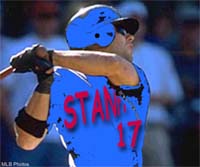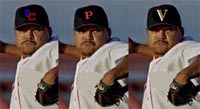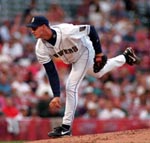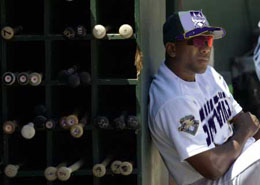| Review: 2001 Season Trades |
|
The first deal of the year came on Jan. 5, with Carolina sending SP Jamey Wright to Philadelphia for a 6th round pick. Philadelphia used the pick to grab RP David Weathers. This innocuous trade was the first of four swaps by Endzone Animals GM Anthony Pucci, who led the league with four trades in 2001. On the surface, the trade looks like a wash, as both pitchers were awful: Carolina released Weathers after he posted a 10.57 ERA in 4 appearances, while Wright went 7-15 with a 6.50 ERA in 31 brutal starts for Philadelphia. But this deal was really a win for Philadelphia if only because they got something for nothing. After the Mudcats released Weathers, the Endzone Animals grabbed him, so in effect they got Wright for free. Not only that, but Weathers was their most effective reliever (2-2, 1 SV, 3.40 ERA in 40 games). Wright isn't worth much next year (11-12, 4.90), but Weathers could be a keeper (4-5, 4 SV, 2.41). The biggest deal of the year happened on Jan. 16, when Brooklyn sent 1B Todd Helton and RP Rich Garces to Stanhope for OF Steve Finley, OF Bobby Higginson, C Mike Lieberthal, 1B Tino Martinez, SP Steve Parris and RP Turk Wendell.
Higginson was arguably Brooklyn's MVP, hitting .281 with 33 HR and 125 RBI, but Finley (.215, 16 HR, 40 RBI) was benched by mid-May, Lieberthal (.252, 11 HR, 51 RBI) was disappointing and frequently injured, Parris (2-6, 8.19 ERA) was released after 10 starts and Wendell (0-0, 1 SV, 5.13 ERA) was mediocre at best. Helton, on the other hand, hit .322 with 63 doubles, 112 runs, 111 RBIs and 29 HRs and started at first base for the Hanover Division in the All-Star game. This trade looks just as bad for the Bean Counters next year: Finley (.275, 14 HR, 73 RBI), Higginson (.277, 17 HR, 71 RBI), Parris (4-6, 4.60 ERA) and Wendell (4-5, 1 SV, 4.43) are barely at replacement level and Lieberthal (121 ABs) didn't qualify. For the Mighty Men, Helton is a no-brainer (.336, 49 HR, 146 RBI) and Martinez returned to Stanhope's roster in the draft and also looks like a keeper for next year (.280, 34 HR, 113 RBI). In short, the Bean Counters might have no keepers from the deal, but the Mighty Men have two. In the final trade before opening day, on March 9, the Sugar Bears sent SP Tomokazu Ohka and RP Lou Pote to Kentucky for OF Carl Everett and their 5th round draft pick in 2002. At first glance the deal seemed heavily weighted toward the Sugar Bears, as Everett was a proven producer. Kentucky was desparate for pitching and took a chance on the young Ohka. Everett jumped out of the gate immediately, batting .366 in his first 101 at bats, with 15 homers. Everett quickly landed on the injury report on April 20. It was the first of four injuries suffered by Everett in the 2001 season. Everett ended up missing 45 games in the year. It looked like Newark had a steal on their hands, but Kentucky was happy with Ohka's first half of the season. Ohka ran off a 12-4 start in his first 20 games with a 3.79 ERA and seemed to be the young ace that Kentucky sorely needed. The second half, however, was a disaster. Ohka completely fell apart. Ohka's last eleven games were a catastrophe, as he went 1-6 with a 6.90 ERA. What's worse is that Kentucky hoped that Ohka would provide a future for their pitching staff. However, Ohka's 2001 season does not suggest keeper by any means. Ohka compiled a 3-9, 5.57 ERA season in 22 games. As for Pote, Kentucky released the reliever after he pitched solidly in 25 games, going 2-1 with a 3.81 ERA. Vancouver would claim him off waivers. Though Everett is going to be a marginal keeper with his mediocre season (.257, 14 HR, 58 RBI, .761 OPS) and attitude problems, Newark gets a decisive win in this deal, since Everett's production over the course of the season compared to Ohka. Throw in the draft pick that Newark got and they win hands down.
What a long strange trip it's been for Garces: Picked up by Brooklyn in the expansion draft, he was dealt to Stanhope in the Todd Helton trade but not protected. Philadelphia drafted him in the 5th round, then sent him to Vancouver for the same pick next year. Garces therefore became the only player to be traded twice in 2001. That bit of trivia is the most interesting thing about this ho-hum trade, which has to be regarded as a marginal victory for Philadelphia. Garces didn't do much for the Endzone Animals (0-3, 3 SV, 4.73), but he did even less for the Iron Fist (0-2, 1 SV, 5.50). He was one of a succession of firemen who failed to hold onto the long reliever role in the Vancouver 'pen. He has some value for next season (6-1, 1 SV, 3.90) but it's unlikely the Iron Fist have room to keep him. A week later, Philadelphia made another move, trading SP Jeff D'Amico and Vancouver's 5th round pick in 2002 to Newark for their 2nd round pick in 2002.
The Endzone Animals made their fourth and final trade on the season June 7, shipping Roger Clemens to Arkansas for their 2nd round pick in 2002 and their 4th round pick in 2003. Clemens, who was mediocre in 15 starts for Philadelphia (5-4, 5.94), was a key addition for the Golden Falcons. Although his numbers weren't much better (4-3, 5.09 in 13 starts), his arrival came at the perfect time: Both Pedro Martinez and Curt Schilling almost immediately went out with injuries, and Clemens' arrival spared the team from having to dip into the horrors of the free agent pool. Next year, this looks like an even better trade for Arkansas, as Clemens won his sixth Cy Young Award after going 20-3 with a 3.51 ERA. The Endzone Animals can make the argument that they were rebuilding, but the truth is no pitcher with Clemens' numbers will be available in the second round, so this is a big win for Arkansas. Even though Philadelphia made a tremendous trade in 1999 to get Clemens for Carolina for a 10th round pick, they had to get more for him this year. Entering the 2001 season, 23-year-old OF Andruw Jones appeared ticketed for the Hall of Fame. But in addition to his real-life struggles, Jones was disappointing with Kentucky (.264, 22 HR, 57 RBI in 84 games). Vancouver, meanwhile, had two young stars stuck at the bottom of their depth chart in 26-year-old OF Shannon Stewart and 25-year-old 1B Sean Casey. On June 18, the two teams swapped their problems. As soon as he hit Vancouver, Jones was "en fuego" hitting a team-best .336 (with a .986 OPS) in 226 ABs with Vancouver. In just 60 games, Jones scored 49 and knocked in 49 runs, with 19 doubles and 11 HRs. But Casey and Stewart were just as happy in Kentucky, hitting .347 and .318 after the trade. But this was really a trade for the future. Jones had a break-out year in 2000 (.303, 36 HR, 104 RBI) but was having a miserable first-half when Vancouver GM Yaro Zajac made the trade, dealing two solid players he couldn't protect for one who still had time to save his season with a strong finish. It didn't happen. Jones' final real-life numbers were disappointing (.251, with a .773 OPS and 142 Ks), though he did slam 34 HRs, win his fourth straight Gold Glove and hit .310 in the post-season, giving hope for a rebound in 2002. On the other side of the equation, Casey's numbers tailed off for the second straight year, but they're still respectable (.310, 13 HR, 89 RBI). Stewart hit .316 with 44 doubles and 103 runs scored and is certainly a keeper. The Hillbillies move to Tijuana with two B-level players to rebuild around. Assuming all three players are protected, the winner of this trade is too close to call until we find out which was the fluke year for Jones -- 2000 or 2001? Heading into the season, he was being compared to Willie Mays and Hank Aaron; now there are whispers he could be another Ruben Sierra or Carlos Baerga. Although Vancouver's keeper list is already crowded with outfielders, Zajac will have to hold onto Andruw and hope for the best. That same day, Brooklyn -- now all but out of the race -- also made a trade for the future, sending SP Chuck Smith and a 5th round draft pick to Stanhope for SP Joe Mays and SP Scott Schoeneweis. Smith, a rookie at age 31, was Brooklyn's second-round draft pick and living up to his potential in his first 19 starts (6-10, 3.38), his W-L record hurt by the league's second-worst offense; Mays and Schoeneweis were waiver-wire pickups off to strong starts in real life. This exchange appeared to give the Mighty Men the arm they needed to make a run at the pennant, while giving the rebuilding Bean Counters two younger starters for next season. But Smith wilted in the heat of the playoff race. Though he did have some strong performances, his final season numbers -- 5-8, 6.06, 1.75 WHIP, 5 quality starts in 15 games -- were miserable. Mays and Schoeneweis were assigned to Brooklyn's farm team, though Schoeneweis pitched brilliantly in a late-season call-up (2-0, 2.51 in two starts). Unfortunately for the Bean Counters, his effort came a little too late -- a second-half surge pushed Brooklyn into a tie for third-place in the division, four games out of a playoff spot. If Smith had continued pitching at the level he'd established before the trade, it's possible he could've helped them into the post-season. But if this trade was a push looking at this year, it won't be in 2002. Smith's season ended a month after the trade with an elbow injury and it's uncertain if he'll be back in time for spring training next year; his numbers (5-5, 4.70 ERA) are unimpressive anyway. Schoeneweis, 27, also struggled: He went from 6-4 with a 3.71 ERA on the day of the trade to 10-11 with a 5.08 ERA by the end of the season, and probably isn't worth a roster spot next year. But 25-year-old Mays proved be one of the league's top starters, finishing the season at 17-13 with a 3.16 ERA and 1.15 WHIP. Even though Stanhope is likely to get a decent player with Brooklyn's fifth-round pick, this trade has to be regarded as a win for Brooklyn, soothing some of the sting of January deal.
Klesko, who had just 11 at-bats for Honolulu, hit .274 with an impressive .937 OPS in 64 games with Hoboken; Tejada, hitting .256 with 10 HR in 234 ABs as the Cutters' DH before the trade, continued to slump with the Sharks, hitting .223 with 10 more round-trippers in 282 ABs. Next year, both players are keepers. The 25-year-old Tejada hit .267 with 31 HR and 113 RBI, an upgrade over Renteria (.260, 10 HR, 57 RBI); Klesko, five years older, hit .286 with 30 HR and 113 RBI, far better than Galarraga (.256, 17 HR, 69 RBI). This trade looks to be just about even as both teams gave up players they couldn't use to improve their lineups, but it was a marginal win for Honolulu because Tejada's youth and position make up Klesko's slightly better numbers, and Vizquel didn't justify his owner's faith with a weak finish (.255, 84 R, 13 SB). A week after adding Chuck Smith, Stanhope made their third and final trade of the season, getting another starter. But to get Rick Reed, 4-4 with a 3.78 ERA and a 1.23 WHIP in 16 starts with woeful Columbia, the Mighty Men had to give up one of their top young players: OF Magglio Ordonez, who despite his awful start (.222, 7 HR, 36 RBI) rounded out one of the league's best outfields with Bernie Williams, Jermaine Dye and Moises Alou. The June 25 deal also included Stanhope's 4th and 8th round draft picks. Looking only at 2001, the Mighty Men made another steal of a deal. Ordonez continued to sputter (.268, 7 HR, 34 RBI in 65 games with Columbia) and Reed established himself as Stanhope's top starter (3-3, 3.95 ERA in 11 starts). But as with the Chuck Smith deal, real life intervened to sour the trade for Stanhope for next season. Reed, 7-3 with a 2.96 ERA on the day of the trade, was traded to the Twins and knocked around by American League batters, posting a 5.19 ERA to balloon his final 2001 numbers to 12-12, 4.05 -- still worth keeping, but not what the Mighty Men paid for. Ordonez, on the other hand, hit .305 and tops Columbia's protected list in OBP (.383), OPS (.916), 2B (40), HR (31) and RBI (113). All this and two draft picks makes this deal a win for the Crusaders. The bottom line: Before acquiring Reed and Smith, the Mighty Men were 4 1/2 games behind the Sugar Bears and tied with Vancouver for the second-best record in baseball. By the end of the season, they were 15 games out and in fourth place. Less than two weeks after swapping Klesko for Tejada, the same two teams made another deal that looked like another win-win for the contending Sharks and the rebuilding Cutters. On June 28, Hoboken sent 32-year-old SP Denny Neagle and 40-year-old RP John Franco to Honolulu for a 2nd round pick. Neither pitcher had been all that impressive with Hoboken -- Neagle was 7-9 with a 5.74 ERA, Franco 1-5 with 2 saves and a 4.81 ERA -- and after the trade, both got even worse. Neagle went 4-4 with a 6.63 ERA in 13 starts with the Sharks, while Franco went 1-3 with 1 save, 2 blown saves and a 5.17 ERA. Neither pitcher is a keeper for next year, and the Sharks actually fell behind the Cutters in the final standings. This deal is a big-time win for Hoboken. The last trade of the year also was one of the most talked-about, as the struggling Harrison Rats dealt a former All-Star to Vancouver for a promising rookie. When the deal was made, one owner said Vancouver overpaid; another said Harrison didn't get enough. The July 5 deal sent SP Tom Glavine and an 11th round draft pick north of the border for Vancouver's Wade Miller and an 8th round draft pick. This "surrender" trade came at a curious time for Harrison, just two games out of the playoffs when they made it. But it was perfect timing for Vancouver, locked in a virtual tie with Arkansas for 1st place in the Morris Division and Vatican City just one game behind. Glavine's so-so numbers with Harrison (8-10, 4.49 ERA) took a turn for the worse with Vancouver (4-7, 5.45), but he did give the Iron Fist a much-needed innings eater. He got hammered in his only post-season start. Miller pitched poorly with Harrison (4-8, 6.23) but the team had already given up on 2001 anyway. The Rats made this deal for the future, and the 25-year-old Miller (16-8, 3.40 ERA) is still one of the top young starters in baseball. But the deal lost some of its luster for Harrison thanks to Glavine's stupendous real-life second-half: On the day of the trade, Glavine was 6-5 with a 4.85 ERA; after the trade, he went with a 10-2, 2.38 ERA, salvaging his final season numbers (16-7, 3.57). Although Glavine didn't help the Iron Fist much in 2001, his strong real-life finish made him a keeper and may herald a return to his glory days next season. On the other hand, the Rats got a starter 10 years younger with even better numbers, but young pitchers are never a safe bet. As with the Andruw Jones trade, this swap still looks too close to call.
|
 Since the Bean Counters didn't protect Martinez and Mighty Men didn't protect Garces, it was really five players for Todd Helton, begging the question: Can 5-for-1 ever be a fair trade? In this case, it wasn't: The Mighty Men won this trade hands down.
Since the Bean Counters didn't protect Martinez and Mighty Men didn't protect Garces, it was really five players for Todd Helton, begging the question: Can 5-for-1 ever be a fair trade? In this case, it wasn't: The Mighty Men won this trade hands down.
 After two months of inactivity, the ice was broken with a hum-drum trade on May 16, with Philadelphia sending RP Rich Garces to Vancouver for a 5th round pick in 2002.
After two months of inactivity, the ice was broken with a hum-drum trade on May 16, with Philadelphia sending RP Rich Garces to Vancouver for a 5th round pick in 2002. Newark seemed to steal the ace away for the stretch run. After all, D'Amico was a first round pick of Philadelphia's. D'Amico was serviceable for Newark, going 7-5 with a 4.45 ERA. He was not effective in the playoffs, however, going 1-0 with a 6.23 ERA in three starts. His keeper value is minimal, as he barely qualified
through an injury-plagued 2001 and only managed to compile a 2-4, 6.08 season. Considering Philly gave up a pick and upgraded to a second round pick, the trade is even since Newark got a solid starter throughout the season and Philadelphia was compensated adequately.
Newark seemed to steal the ace away for the stretch run. After all, D'Amico was a first round pick of Philadelphia's. D'Amico was serviceable for Newark, going 7-5 with a 4.45 ERA. He was not effective in the playoffs, however, going 1-0 with a 6.23 ERA in three starts. His keeper value is minimal, as he barely qualified
through an injury-plagued 2001 and only managed to compile a 2-4, 6.08 season. Considering Philly gave up a pick and upgraded to a second round pick, the trade is even since Newark got a solid starter throughout the season and Philadelphia was compensated adequately.
 Hoboken had two shortstops, Miguel Tejada and Omar Vizquel, but no first baseman behind a struggling Andres Galarraga; Honolulu had three first basemen, Ryan Klesko, Jason Giambi and David Segui, but no shortstop behind the slumping Edgar Renteria. So, in a "win-win" trade, Tejada and Klesko swapped sides June 19.
Hoboken had two shortstops, Miguel Tejada and Omar Vizquel, but no first baseman behind a struggling Andres Galarraga; Honolulu had three first basemen, Ryan Klesko, Jason Giambi and David Segui, but no shortstop behind the slumping Edgar Renteria. So, in a "win-win" trade, Tejada and Klesko swapped sides June 19.